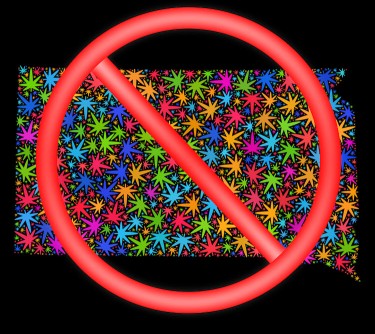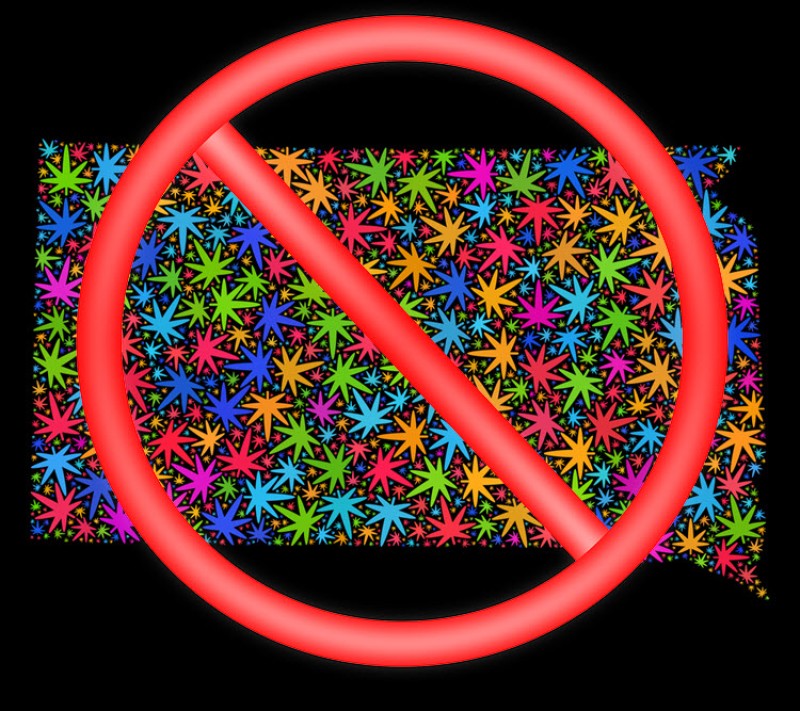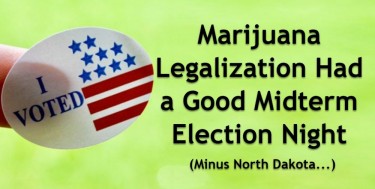
In November 2020, South Dakota voters came out in large droves to vote for the cannabis legalization initiative. Barely a year later, after being dragged on for so long, the state's Supreme Court has kicked out the initiative. The organizers of the initiatives and other cannabis advocates in the state have no other choice but to start afresh.
The Court argued that the ballot initiative went against the "single object" rule required for amending contents of a constitution.
Making History
During the last general elections, South Dakota residents, cannabis advocates, and most importantly, the voters made history by endorsing ballot initiatives that were written to legalize the use of medical and recreational marijuana in the state.
The initiative, titled Amendment A, appealed to the required number of voters to be victorious with an eight-point margin. This is impressive because the state is mainly conservative, and most of its voters are Republicans.
The Start Of An Unending Legal Battle
Almost immediately after the initiative was successfully approved, a legal challenge against the language was issued. Kristi Noem, Governor of South Dakota ( R ) and an anti-cannabis personality, backed the challenge up, and the entire issue has been tied up in litigation since then.
In February, when the first ruling was issued, the judge declared that the initiative used languages that legalized and regulated three new industries instead of one. The "single subject' rule is the primary basis on which various cannabis initiatives have been thrown out of the race.
For constitutional amendments, an initiative can only seek to address a single topic. To address other issues simultaneously, more initiatives have to be written and penned down.
The now-discarded initiative would have legalized recreational cannabis, industrial hemp, and medical cannabis.
Chief Justice Steven Jensen says that the Amendment A initiative touches three separate issues, with each having its own unique roles and features. Gov. Kristi Noem had opposed the fundamental reforms from the start; some suspect that the executives knew about the single object rule but decided to list the initiative go on so it could be used as the weak point to bring it down. It was more or less like a backup plan. The state did not realize that the initiative could appeal to about 54% of the total voters.
Fortunately, the court's overturning of Amendment A does not in any way have an adverse effect on Measure 26.
Measure 26 is the initiative that focused on the medical use of marijuana, and it passed with about 70% voter support during the general elections in 2020.
More Details on Amendment A
The court's ruling was based on Article XXIII, section 1 of the state's constitution. This paragraph states that all proposed amendments should not embrace more than one topic issue. The High court explained that that section of the Constitution was included to prevent voters from passing unrelated subjects into law.
The Supreme Court described it as a means to prevent the malicious act of combining two or more different subjects in one amendment to guarantee the approval of an issue that would have failed had the provisions been written independently of each other.
The authors of Amendment A, as well as the majority who approved the initiative, stated that a higher percentage of the measure revolved around the licensing, taxation, and overall regularization of a single subject—which is the legalization of adult-use weed for residents who are at least 21 years or older. The majority also accepted that the remaining provisions detailing the medical use of marijuana and the establishment of an industrial hemp industry touched on the two different subjects.
In court, the voters argued that the initiative was compiled with the single-subject rule as all the included provisions referred to just one species of plant; marijuana. In the court's view, this argument was just a way to cancel out the purpose for which Article XXIII was written. The justices pointed out that the measure's contents defined hemp as a non-psychoactive subspecies of marijuana with a travel amount of THC. This definition itself proves that hemp is distinct from marijuana.
According to the justices, the initiative's authors tried to manipulate the voters into approving a combined measure. Lumping amendments on hemp and medical cannabis together with a broader provision for recreational cannabis put voters at an awkward point. It forced voters who favored just one out of three or two out of three measures to approve all actions.
Scott Myren, a South Dakota Justice, wrote in dissent that Amendment A was intended to be a comprehensive measure that touched all aspects of legalization, use, production, and sales of marijuana. In his view, the subject matter, in this case, is complex and multi-faceted. He believed there was little the authors could have done to prevent the initiative from containing additional prescriptions. In as much as all these included propositions can be linked with cannabis, then the initiative was on track. Myren argues that there is no assertion that the voters were confused or misinformed about the contents of the approved measure.
Trying Again Next Year
The only way Amendment A can be passed or implemented will be through the state's legislative arm. The lawmakers can vote to enforce the policies in the initiative; if they don't, voters will once again go through the route of starting another initiative before the midterm elections. This time, all the initiative authors will address all the objections issued by the state's judicial system.
Last Words
Schweich's organization has begun processing a new initiative that would be included on the mid-election ballots.
The fate of recreational cannabis in South Dakota rests on either the success of this initiative or the two organization bills that would be considered when the legislature resumes session.
There's a good chance all these measures might fall off due to Governor Noem's stance on cannabis legalization. However, the governor has promised to go on with implementation of the medical cannabis program that was approved through Measure 26 last November.







